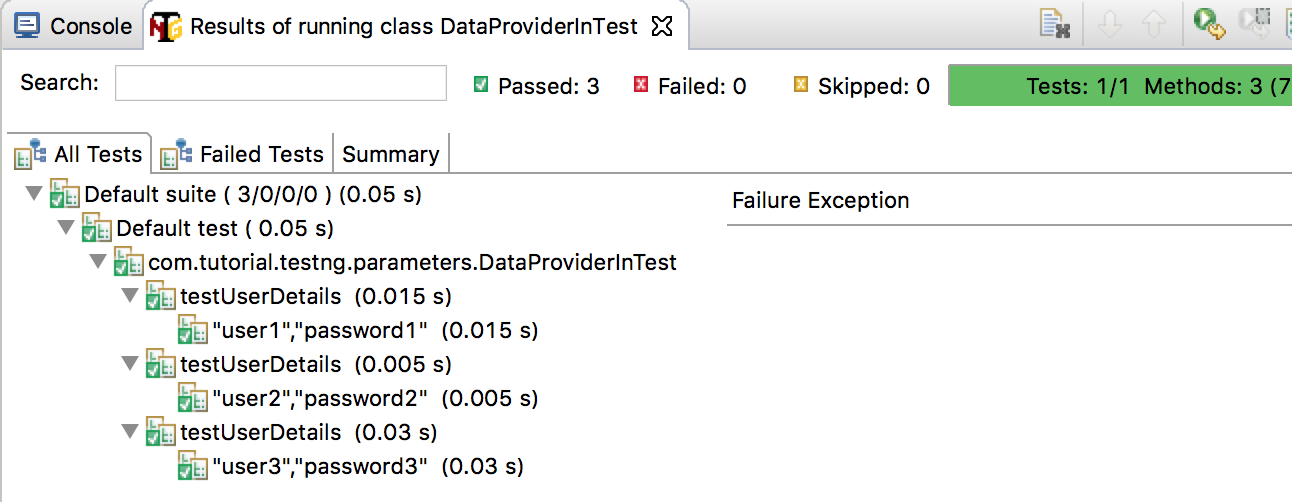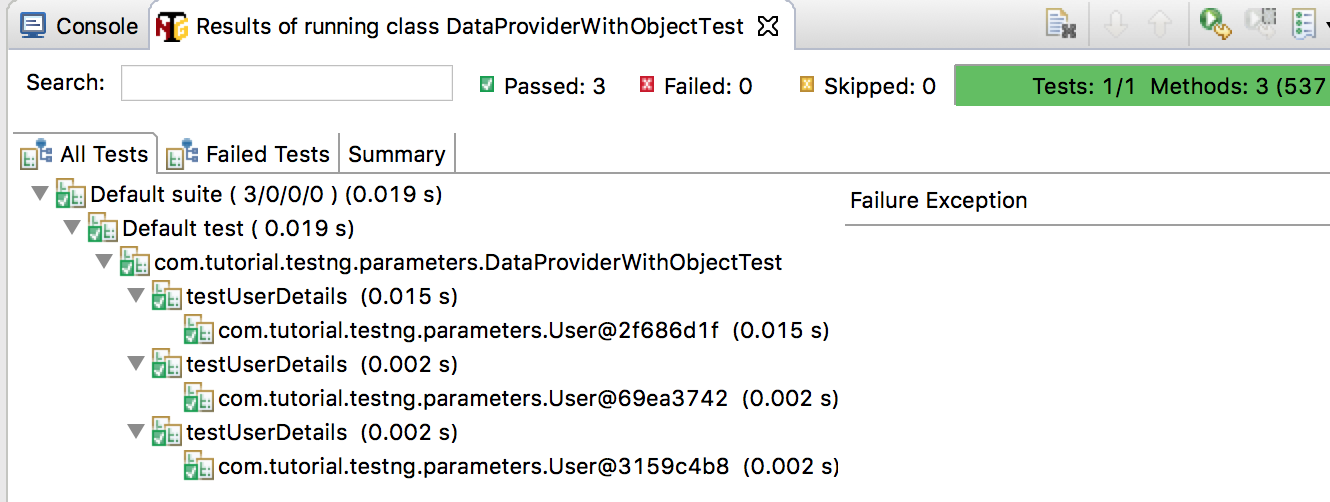There are multiple cases, when we have to validate our use-cases where the logic should be same but the test data is different and we must validate our logic for multiple parameters. TestNG provides a very easy way of passing parameters using the DataProvider. In this article we are going to learn how to use DataProvider with @Test.
A Data Provider is a method on your class that returns an array of array of objects.
How to pass String parameter in DataProvider:
package com.tutorial.testng.parameters;
import org.testng.annotations.DataProvider;
import org.testng.annotations.Test;
public class DataProviderInTest {
@Test(dataProvider = "userDetails")
public void testUserDetails(String user, String password) {
System.out.println("Test User: " + user + " Password: " + password);
}
@DataProvider(name = "userDetails")
public Object[][] userDetails() {
return new Object[][] {
{ "user1", "password1" },
{ "user2", "password2" },
{ "user3", "password3" } };
}
}
Output:
Test User: user1 Passsword: password1
Test User: user2 Passsword: password2
Test User: user3 Passsword: password3

I have used String here in this example but you can pass other data types also using the data provider.
How to pass Class Object in DataProvider:
Using DataProvider you can pass Class object parameters.So we need to create multiple objects of a particular Class and passed as DataProvider to our @Test method.
Step 1: Create a User Class POJO which has User and Password Value.
package com.tutorial.testng.parameters;
public class User {
private String user;
private String password;
public String getUser() {
return user;
}
public String getPassword() {
return password;
}
public User setUser(String user) {
this.user = user;
return this;
}
public User setPassword(String password) {
this.password = password;
return this;
}
}
Step 2: Now create a Test Class with DataProvider and pass multiple User.java object and print the user details in our TestCase.
package com.tutorial.testng.parameters;
import org.testng.annotations.DataProvider;
import org.testng.annotations.Test;
public class DataProviderWithObjectTest {
@Test(dataProvider = "userDetails")
public void testUserDetails(User users) {
System.out.println("Test User: " + users.getUser() + " Password: " + users.getPassword());
}
@DataProvider(name = "userDetails")
public Object[][] userDetails() {
return new Object[][] {
{ new User().setUser("user1").setPassword("password1") },
{ new User().setUser("user2").setPassword("password2") },
{ new User().setUser("user3").setPassword("password3") }, };
}
}
Output:
Test User: user1 Password: password1
Test User: user2 Password: password2
Test User: user3 Password: password3
PASSED: testUserDetails(com.tutorial.testng.parameters.User@2f686d1f)
PASSED: testUserDetails(com.tutorial.testng.parameters.User@69ea3742)
PASSED: testUserDetails(com.tutorial.testng.parameters.User@3159c4b8)

What If you pass wrong No of arguments in DataProvider:
DataProvider expectes you to pass and receive the same set of arguments, If there is a mismatch in the arguments, It will thrown an exception and TestCases will not Run.
There is org.testng.internal.reflect.DataProviderMethodMatcher class in testNG used for verification, using a method getConformingArguments() for verifying the no of arguments.
@Override
public Object[] getConformingArguments(){
if (ThreeStateBoolean.NONE.equals(getConforms())) {
conforms();
}
if (matchingMatcher != null) {
return matchingMatcher.getConformingArguments();
}
throw new MethodMatcherException("Data provider mismatch", getContext().getMethod(), getContext().getArguments());
}
}
In this Example below we will pass an extra Argument from the DataProvider but will not accept that argument in our @Test method and Test will fail with exception.
package com.tutorial.testng.parameters;
import org.testng.annotations.DataProvider;
import org.testng.annotations.Test;
public class DataProviderFailure {
@Test(dataProvider = "userDetails")
public void testUserDetails(String user, String password) {
System.out.println("Test User: " + user + " Password: " + password);
}
@DataProvider(name = "userDetails")
public Object[][] userDetails() {
return new Object[][] { { "user1","password1","extraValue" },
{ "user2","password2","extraValue" },
{ "user3","password3","extraValue" } };
}
}
Output Exception:
org.testng.internal.reflect.MethodMatcherException:
Data provider mismatch
Method: testUserDetails([Parameter{index=0, type=java.lang.String, declaredAnnotations=[]}, Parameter{index=1, type=java.lang.String, declaredAnnotations=[]}])
Arguments: [(java.lang.String)user1,(java.lang.String)password1,(java.lang.String)application]